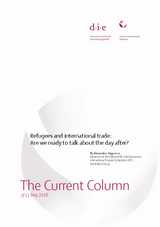The Current Column
Refugees and international trade: are we ready to talk about the day after?
Ragoussis, AlexandrosThe Current Column (2016)
Bonn: German Development Institute / Deutsches Institut für Entwicklungspolitik (DIE) (The Current Column of 11 May 2016)
Bonn, 11 May 2016. The debate about the refugee inflow, wave, or crisis – terms used alongside an array of toxic metaphors to describe the phenomenon – is not about the long-run, and hardly so about the medium run. The sheer number of refugees crossing its borders has caught Europe unprepared. And the challenge upsets both public opinion and government actions, independently of whether openness makes sense economically, ethically, politically, and to whom. Answers to longer-term questions such as ‘do we expect immigration to boost exporting capacity?’, or ‘does trade help in refugee integration?’, do not make the current struggle any easier. Nonetheless, it is worth looking into these questions. Their value lies rather in our ability to maintain an objective thinking about the migration of refugees. It is thus of paramount importance to reiterate the arguments we have about the day after, and make sure they enter the equation when policy makers decide on the practical who, where and how of this matter. But what do we know about the relationship between migration (of refugees included), ethnic diversity and international trade? Economic studies show us that ethnic minorities are good for trade: they have superior knowledge of foreign country markets, language, customs, business practices, thereby lowering transaction costs for exports. Their networks also make sure contracts and business commitments are respected. And that is only part of the story. Migrants have preferences for products that are not necessarily available in the host country, raising the demand for imports from back home as well as a variety of other origins. Observations supporting this abound: Already in the 1990s researchers were reporting that the most frequent occupation of Korean immigrant entrepreneurs in the United States is import-export trading activities with Korea. The ‘Chinatown effect’ is an unconventional term used for trade between countries that host populous Chinese communities. Let’s take a closer look at the numbers. The estimates coming from almost 50 related studies are telling: a 10 percent increase in the stock of immigrants can boost international trade on average by 1.5 percent. And what does it mean to trade more across borders? In fact, a lot more than what we may first think. Public debates about the economic effects of migration have focused on the usual suspects: wages and employment; public finances; growth; demography. Expectations on all these fronts are often ambiguous: whether or not immigration hurts public finances, contribute to growth, generate employment, depends on an array of factors. Unsurprisingly, the internationalisation effect is more clear-cut and, as such, it stands a good chance of being the neglected factor that could make a difference. Business across borders also brings about more jobs, income, and productivity through competition with multinationals; in other words, better chances of fostering positive outcomes on all fronts. What is true for migrants applies also to refugees. The presence of new populations, often highly skilled and involuntarily displaced, will strengthen Europe’s growth and economic ties with its adjacent regions, bringing about what economists like to call a win-win situation. In fact, upon improvement of security in Middle East and North Africa and a likely return to growth in the medium-run, Europe will not only enjoy the advantage of proximity, but also stronger cultural ties via the very pool of immigrants than now stands by its borders. Investing in these linkages is hence more than a moral imperative; it is strategic one, given the global paucity of opportunities for economic expansion and fierce competition with rising powers over economic space in the decades ahead of us. Yet some immigrants may be triggering trade effects in host countries more than others: High-skilled or better-educated immigrants have been shown to contribute to a larger pro-trade impact. Also, the scarcer the better: populations culturally different and relatively rare in host countries bring about knowledge and skills that are more precious. These findings raise questions we cannot fully answer as of yet. We may know a lot about demographics, occupations and spatial concentrations of generations of immigrants over the 20th century. We know very little about incoming refugees in all these respects. All the more reason to find out. Politics and international law aside, there may be economic arguments about how Europe should respond to the current migration flow. Providing a shield to populations fleeing war, conflict and starvation is beyond question. The “what next” is not. There may be corners of Europe where some refugees stand to contribute more to local economies and share a larger part of the prosperity that comes with it. This is an issue we, regrettably, do not discuss at the moment. Our trouble is that, as Europeans, we haven't yet sorted out the fundamentals surrounding the presence of refugees in our lands. Xenophobia, settlement bills and political rivalry leave little space to talk about the day after, however valuable this discussion may be right now. Alexandros Ragoussis is Associate Fellow of the German Development Institute / Deutsches Institut für Entwicklungspolitik (DIE).


